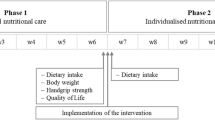Abstract
Background and aims: Lack of compliance on the part of old participants has been reported in several randomised nutritional intervention studies. However, lack of compliance by staff may also have a significant impact on the effect of interventions. The aim of this paper is to test the hypothesis that, in an intervention study with focus on nutrition, exercise and oral care in old nursing home residents, lack of compliance by staff rather than residents is the major problem. Methods: An eleven week randomized, controlled trial in seven nursing homes, with nutrition, exercise and oral care strategies, and 62 residents in the intervention group. Staff and researchers documented compliance of residents with the various strategies, including notes about problems. Results: The nutrition and exercise strategies were well accepted by participating residents. The main reason for non-compliance may be related to staff problems. Up to one-sixth of the planned nutrition interventions were not documented as having been given to the residents. Conclusions: Lack of compliance by staff rather than residents seemed to be the main problem. In order to improve compliance in future studies, more focus should be put on the effect of practical implementation on staff. Insight into these matters may give valuable information to counteract staff problems, facilitate implementation in long term, and hence improve the benefits of nutrition interventions.
Similar content being viewed by others
Reference
Milne AC, Potter J, Avenell A. Protein and energy supplementation in elderly people at risk from malnutrition. The Cochrane Database of Systematic Reviews 2005, Issue 1. Art. No: CD003288.pub2. DOI: 10.1002/14651858. CD003288.pub2.
Beck AM, Ovesen L. Body mass index, weight loss and energy intake of old Danish nursing home residents and home-care clients. Scand J Caring Sci 2002; 16: 86–90.
Bates CJ, Benton D, Biesalski H et al. Nutrition and aging: a consensus statement. J Nutr Health Aging 2002; 6: 103–16.
Simmons SF, Garcia ET, Cadogan MP et al. The Minimum Data Set weight-loss quality indicator: does it reflect differences in care process related to weight loss? J Am Geriatr Soc 2003; 51: 1410–8.
Blaum CS, Fries BE, Fiatarone MA. Factors associated with low body mass index and weight loss in nursing home residents. J Gerontol 1995; 50A: M162–8.
Beck AM, Ovesen L, Schroll M. Homemade oral supplement as nutritional support of old nursing home residents, who are undernourished or at risk of undernutrition based on the MNA. A pilot trial. Aging Clin Exp Res 2002; 14: 212–5.
Esmarck B, Andersen JL, Olsen S, Richter EA, Mizuno M, Kjær M. Timing of post-exercise protein intake is important for muscle hypertrophy with resistance training in elderly humans. J Physiol 2001; 535: 301–11.
Rosendahl E, Lindelöf N, Littbrand H et al. High-intensity functional exercise program and protein-enriched energy supplement for older persons dependent in activities of daily living: A randomised controlled trial. Aust J Physiother 2006; 52: 105–13.
Rydwik E, Frändin K, Akner G. Physical training in institutionalised elderly people with multiple diagnoses — a controlled pilot study. Arch Gerontol Geriatr 2005; 40: 29–44.
Ekstrand K, Christensen J, Schmidt C. Implementation of a professional tooth cleaning programme on residents in nursing homes. Outcome on plaque-induced diseases. Tandlægebladet 1998; 102: 368–73 (in Danish).
Rickli RE, Jones CJ. Senior Fitness Test Manual. Champaign, IL: Human Kinetics 2001.
Morris J, Nonemarker S. Minimum Data Set plus training manual. Natick (MA): Eliot Press, 1991.
Hawes C, Morris JN, Phillips CD, Mor V, Fries BE, Nonemaker S. Reliability estimated for the Minimum Data Set for nursing home residents’ assessment and care screening (MDS). Gerontologist 1995; 35: 172–8.
Snowden M, McCormick W, Russo J et al. Validity and responsiveness of the Minimum Data Set. J Am Geriatr Soc 1999; 47: 1000–4.
Morris JN, Fries BE, Morris SA. Scaling ADLs within the MDS. J Gerontol 1999; 54: M546–53.
Morris JN, Fries BE, Mehr DR et al. MDS Cognitive Performance Scale. J Gerontol 1994; 49: M174–82.
Schroll M, Jónsson PV, Mor VC, Berg K, Sherwood S. An international study of social engagement among nursing home residents. Age Ageing 1997; 26(S2): 55–9.
Bonnefoy M, Cornu C, Normand S et al. The effects of exercise and protein-energy supplements on body composition and muscle function in frail elderly individuals: a long-term controlled randomised study. Br J Nutr 2003; 89: 731–8.
Rydwik E, Frändin K, Akner G. Effects of physical training on physical performance in institutionalised elderly patients (70+) with multiple diagnoses — a systematic review. Age Ageing 2004; 33: 1–11.
Wårdh I, Andersson L, Sörensen S. Staff attitudes to oral health care. A comparative study of registered nurses, nursing assistants and home care aides. Gerodontology 1997; 14: 28–32.
Simmons SF, Patel AV. Nursing home staff delivery of oral liquid nutritional supplements to residents at risk for unintentional weight loss. J Am Geriatr Soc 2006; 54: 1372–6.
Simmons SF. Quality improvement for feeding assistance care in nursing homes. J Am Med Dir Assoc 2007; 8: S12–7.
Bachrach-Lindström M, Jensen S, Lundin R, Christensson L. Attitudes of nursing staff working with older people towards nutritional nursing care. J Clin Nurs 2007; doi: 10.1111/J.1365-2702.2006.01868.x.
Christensson L, Unosson M, Bachrach-Lindström M, Ek A-C. Attitudes of nursing staff towards nutritional nursing care. Scand J Caring Sci 2003; 17: 223–31.
Shatenstein B, Ska B, Ferland G. Employee reactions to the introduction of a bulk food distribution system in a nursing home. Can J Diet Pract Res 2001; 62: 18–25.
Author information
Authors and Affiliations
Corresponding author
Rights and permissions
About this article
Cite this article
Beck, A.M., Damkjær, K. & Tetens, I. Lack of compliance of staff in an intervention study with focus on nutrition, exercise and oral care among old (65+ yrs) Danish nursing home residents. Aging Clin Exp Res 21, 143–149 (2009). https://doi.org/10.1007/BF03325222
Received:
Accepted:
Published:
Issue Date:
DOI: https://doi.org/10.1007/BF03325222



